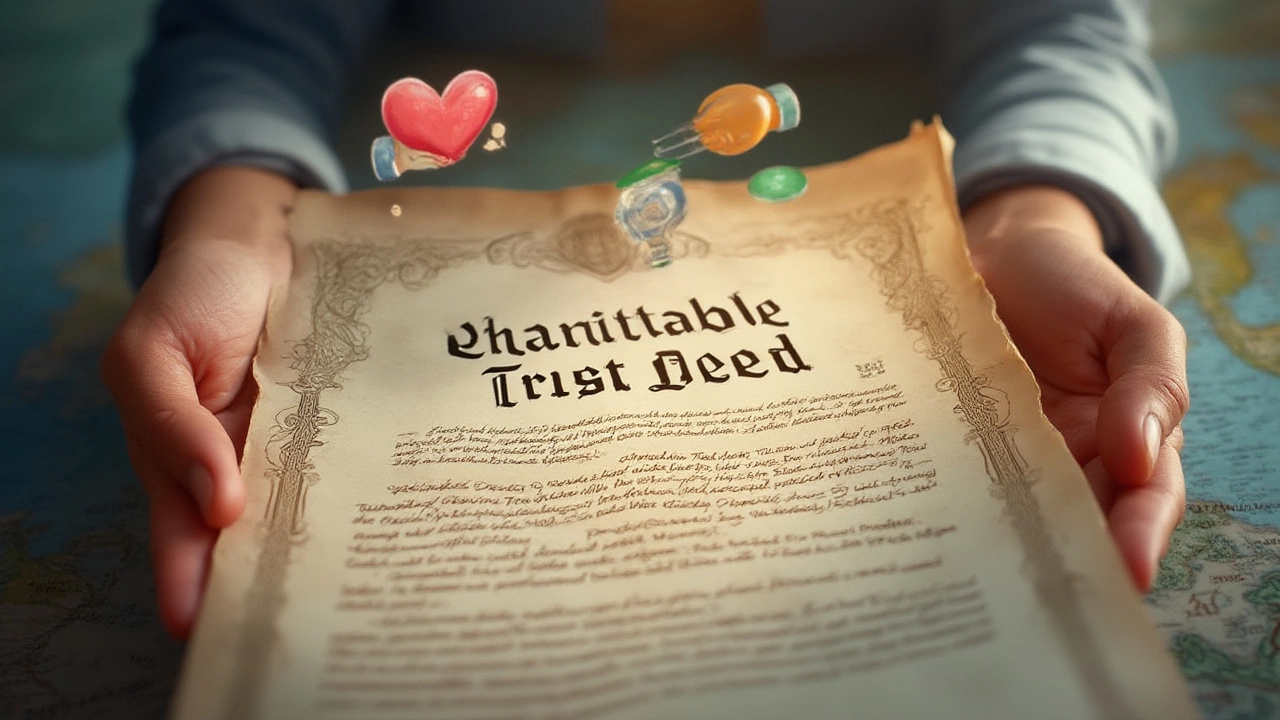Imagine you’ve just scrolled past another local charity story on Facebook—another group making waves, funding research, feeding kids, or building houses. Ever wondered who’s really powering all that? Sometimes it’s just passionate people. Other times, it’s a bit more formal—a structure that lends clout and credibility. That’s where the idea of setting up a charitable trust comes in. It’s not just for billionaires with legacy complexes. Regular New Zealanders, friends banding together, businesses wanting real impact—so many folks set up trusts to handle money transparently, guarantee long-term support, and keep big promises to their community. Turns out, this old-school structure is still one of the smartest choices if you’ve got a cause close to your heart and want to see your impact endure.
What Exactly Is a Charitable Trust and How Does It Work?
Let’s unpack the basics: a charitable trust is a legal setup that holds assets (this could be cash, property, shares, even rare art) for a specific charity goal. In NZ, these trusts are governed by their trust deed, a chunky document spelling out the mission, the rules, and who’s in charge (the trustees). It’s a bit like handing your cause to a group of responsible adults (trustees) with a written list of instructions they’re legally bound to follow. You’re not setting up a business. You’re creating a vessel for good—where profits go straight back to your mission, not into anyone’s pocket.
Here’s a quirky tidbit: charitable trusts aren’t exactly new to Aotearoa. The very first one dates back to 1845! Fast-forward to today, and there are over 27,000 registered charities in New Zealand—many set up as trusts because of the structure’s flexibility and credibility. What’s powerful about a trust is the combination of freedom (you define your own goals and how to reach them) plus the guardrails of legal protection. Unlike clubs or incorporated societies, a trust doesn’t have members who vote you out or derail your plans. The trust is there for the cause—it can outlive its founders, keep going for generations.
Most people picture massive foundations, but you don’t need millions to start. It can be as humble as a small pot of savings, a bequest, or an annual fundraising sausage sizzle. Real story: The Graeme Dingle Foundation began as a trust with just a handful of backers and has gone on to impact thousands of young Kiwis across the country.
People also set up charitable trusts for all sorts of reasons: running an after-school arts program, caring for endangered birds, funding medical research, supporting mental health, or simply preserving a beautiful bit of bush for the public. Each trust is unique, focused, and built around its own deeds.
Let's get real for a second—setting up a trust does mean paperwork. You'll need a deed, at least one trustee (NGO experts say three’s the magic number for decision-making), and clear rules on what happens to the trust’s stuff if it all winds down. Most New Zealanders register with Charities Services, a branch of the Department of Internal Affairs. This step brings two big perks: transparency (the public can see your deeds, financials, and who’s at the helm) and donor confidence. Oh, and charities that qualify get sweet tax exemptions from IRD—meaning more cash goes right where it’s needed.
So, what are charitable trusts actually doing in NZ? Scroll through the Charities Register and you’ll see everything from school lunch initiatives to big regional environmental projects. Here’s a taste of how trust models compare to other types of charitable structures:
| Structure | Who’s in Charge? | Can It Raise Donations? | Legal Liability | When’s It Best? |
|---|---|---|---|---|
| Charitable Trust | Appointed Trustees | Yes | Limited | Ongoing, asset-based causes |
| Incorporated Society | Members & Committee | Yes | Limited | Community, clubs |
| Charitable Company | Company Directors | Yes | Limited | Trading activities, business-like charities |
Documentation and regular reporting keep everything on the up and up, which matters if you’re attracting sponsors, bidding for government contracts, or simply want your supporters to trust you.

The True Benefits: Why Bother Setting Up a Charitable Trust?
Let’s cut to the chase—why go to all this trouble? Turns out, there are a lot of tangible and intangible upsides. The most obvious one is long-term impact. Think about what happens when a bunch of well-intentioned people run a charity fund without any structure: money gets muddled, arguments break out, and assets can even disappear if someone drifts away. By contrast, a charitable trust locks everything in. Decisions are made by appointed trustees, not random committee drama. Money must be spent strictly in line with the mission—if it isn’t, trustees (and yes, even their personal assets) can be held accountable.
Credibility is a huge factor, too. Sponsors, government agencies, big donors—none of them want to hand cash to an outfit with a shady balance sheet or unclear mission. When you’re registered as a trust (and, preferably, as a tax-exempt charity), everything’s in the open. People can check annual returns, deeds, even trustee appointments. This transparency builds public support. In fact, Charities Services NZ reports that public giving climbs by up to 60% when groups are properly registered and reporting.
Tax breaks are another biggie. If your trust gains charitable status, not only do you skip income tax—your donors can claim generous tax credits, too. Kiwi donors get 33.33 cents back for every dollar they give, up to their annual income. That’s not pocket change. And those who leave bequests in their will can get their final wishes handled in a tidy, tax-savvy way. Businesses love this too: company donations up to the amount of their net income are deductible, making it an attractive option for corporate philanthropy.
Ever heard of “perpetual legacy”? Say you want your support for local arts, youth, health, or environment to go on—no matter what happens in your own life. The trust continues, even as trustees change. Famously, trusts like the ASB Community Trust (now Foundation North) have powered community projects for decades, thanks to smart asset management and a clear deeds. They operate independently from government or individuals—making sure the cause, not the personalities, stay in charge.
Add to that, trusts are the go-to for holding big gifts, property, or capital that shouldn’t be gambled away. Some parks, marae, heritage buildings, or community centres are owned directly by trusts, meaning future generations get to enjoy the benefits, free from weird ownership disputes or political changes.
Here’s an often-overlooked perk: a charitable trust helps bring passionate people together, especially when they want to work across regions or time zones (or in Aotearoa’s case, across islands). The structure gives partners and stakeholders a clear legal point of contact. Imagine collaborating with local mana whenua, councils, and schools on a conservation project—the trust lets everyone operate under clear kaupapa and expectations.
There’s also flexibility in how you set up your trust: big, small, flexible, conservative, or even targeted at one event or one year. Want to start a scholarship fund? Or maybe you just want to protect a little slice of coastline or fund research into rare diseases? Your trust deeds can be as specific or as broad as you need. Some even let you specify exactly what happens to assets if the project winds up—making sure everything stays aimed at public good.
- Engine for public good—funds, assets, and energy are locked into one clear purpose
- Boosts transparency and trust with donors and the public
- Protects assets from private interests or family squabbles
- Tax breaks benefit both trust and donors
- Can last forever, regardless of who started it
So, for anyone dreaming bigger than a bake sale or wanting their legacy to actually last, setting up a charitable trust ticks boxes you probably didn’t even think about.

Steps to Set Up a Charitable Trust in New Zealand—And Making It Work
Ready to roll up your sleeves and get started? The process can seem intimidating, but honestly, it boils down to a strong plan, good people, and a clear mission. Here’s how most New Zealanders do it:
- Refine your mission: What’s your cause? Is it education, environment, health, art, or something else? Nail it down—you’ll need to spell this out in the deed.
- Pick trustworthy trustees: Trustees act as guardians, so choose wisely. Diversity of skills and perspectives helps (finance, law, lived experience, community voice). Three to five is typical.
- Draft your trust deed: There are templates online or you can hire a lawyer if your affairs are complicated. Key points: name, objectives, powers, trustee appointments, winding up procedure, money rules. Some groups add rules about ethical investment or sustainability, too.
- Sign and settle: Trustees formally adopt the deed, often with a small “settlement sum” (even $10) to start the trust.
- Register as a charitable trust board: Optional, but a good call as it gives your trust legal personality—meaning it can get its own IRD number, enter contracts, and hold property.
- Apply for charity status: Not automatic—Charities Services will vet your trust’s purpose and rules. Most get approved if the cause genuinely benefits the public.
- Get an IRD number and register for tax exemption: You’ll need this for donations and running the books.
- Open a bank account: Register in the trust’s name, not your own. Banks will want to see your deed and trustee info.
- Set up proper records: You need to report income and spending yearly. There are tools and charities accounting packages that make this easy.
- Get fundraising: Now the fun starts—apply for grants, host events, woo donors, or start with a givealittle campaign.
Average turnaround to get a charitable trust ticking? With a motivated group, you can set up shop in a matter of weeks (if you skip the lawyers and do it yourself). The Charities Register reports about 95% of new applicants succeed on their first go—it’s all about clarity and paperwork. Thirty years ago, only the big endowments got this far, but the process is way more open now.
If you want to get nerdy, Charities Services provides step-by-step checklists. But some real gold nuggets only come from seasoned trustees: don’t overload your deeds with rules that will cramp you later, do your banking and book-keeping online, and make your trust open to new (diverse) trustees often. Always keep your mission in front of every big decision—that’s what keeps people on board when the novelty wears off.
Biggest mistake? “Founder syndrome”—where one person thinks they own the trust. You don’t! Trustees are all equals, and the trust exists for the public good, not any individual. And when things go right, it’s magic. Your local impact becomes national, maybe even global. The structure protects your cause, boosts donations, and (maybe best of all) shows your community you mean business.
Every year in New Zealand, more than a thousand new charitable trusts get registered. Some are tiny, tackling hyper-local problems. Others are legacies left in wills or started by major businesses giving back. All add up to a philanthropic ecosystem worth billions—funding everything from hospitals to skate parks, scholarships to animal rescue shelters. If you’re passionate, organized, and want to see your good deed last longer than any one person could, setting up a charitable trust isn’t just smart. In many ways, it’s essential. If you’re thinking about making your cause official, you’ve just found your blueprint.







